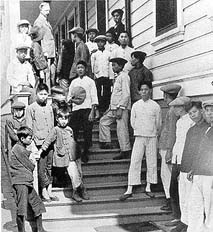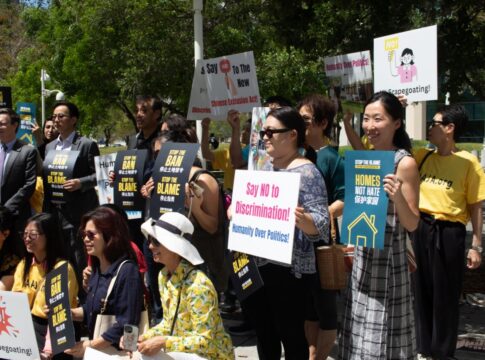A reader of my column recently lamented that her co-worker is taking a political stand by using the term, “American” to describe anyone born in this country regardless of ethnic heritage as a means of appearing color-blind. In this example, while the notion of being “color-blind” sounds laudable, it can also be interpreted as being insensitive to someone’s background, history, and culture. The reader explains, “Call me overly prideful but I strongly prefer the term Asian-American because just saying ‘American’ the way my co-worker did is a tad disrespectful of my family’s heritage and our origins and how they shape us today”.
Keep in mind the controversy of hyphenated Americans is not new in this country. Nearly one hundred years ago in 1915, as America was on the brink of entering World War I, former President Theodore Roosevelt was also openly critical of Americans who had this split identity. In a speech to a largely Irish Catholic audience he left no doubt where he stood on this issue:
“There is no room in this country for hyphenated Americanism. When I refer to hyphenated Americans, I do not refer to naturalized Americans. Some of the very best Americans I have ever known were naturalized Americans, Americans born abroad. But a hyphenated American is not an American at all … The one absolutely certain way of bringing this nation to ruin, of preventing all possibility of its continuing to be a nation at all, would be to permit it to become a tangle of squabbling nationalities, an intricate knot of German-Americans, Irish-Americans, English-Americans, French-Americans, Scandinavian-Americans or Italian-Americans, each preserving its separate nationality, each at heart feeling more sympathy with Europeans of that nationality, than with the other citizens of the American Republic … There is no such thing as a hyphenated American who is a good American. The only man who is a good American is the man who is an American and nothing else.”
Part of the fear from that era was the need for Americans to feel united and reassured in the face of war. Former president Woodrow Wilson also echoed Roosevelt’s concerns, by saying “Any man who carries a hyphen about with him carries a dagger that he is ready to plunge into the vitals of this Republic whenever he gets ready.”
LATEST STORIES
This nationalistic fervor and fear of ethnic Americans betraying their country was best exemplified during World War II as more than 110,000 Japanese-Americans were sent to incarceration camps with grave concerns they would betray their allegiance to America.
Today, the issue of hyphenated Americans remains a concern possibly due to our country’s immigration policies and the impact of diversity on the American psyche. Conservative radio talk-show host, Rush Limbaugh goes so far as to differentiate between past immigrants and today’s newer arrivals. “Italian-Americans came, and they became Americans. They held on to their traditions and there were Little Italy’s in various cities around and all the vestiges. But they were Americans first, not Italians first. And they were not demanding that America change to accommodate what they had brought with them. They changed to fit into what America was. They essentially were assimilating into a distinct American culture that they craved to be part of.”
Limbaugh’s concern isn’t so much of the hyphenated brand of Americans as much as the desire for assimilation. How we define assimilation is a topic unto itself but it’s worth noting that Italian-Americans, German-Americans, and earlier European immigrants don’t carry the perceived stigma or threat of loyalty as much as that of say an Arab-American, Mexican-American, or Asian-American.
So despite the advances this country has made in terms of tolerance and inclusion, there’s still the real fear of racial divisions and in-group classification leading to a fragmentation or disintegration of American society. I wholeheartedly disagree with that fear as my own identification as a Chinese-American in no way lessens my patriotism or allegiance to the United States. If anything, it magnifies my loyalty since the description of myself as Chinese-American or Asian-American is to inform others of my Americanism while also paying tribute and acknowledging the part of me that is different from that of an Italian-American or Jewish-American. I am comfortable with cultural differences because I believe those differences is what makes us even more “American”.
(About the Author: Sam Louis is a psychotherapist and relationship’s coach in Seattle & Bellevue. He holds a Master of Art’s degree in clinical psychology with an emphasis on marriage & family therapy.)









